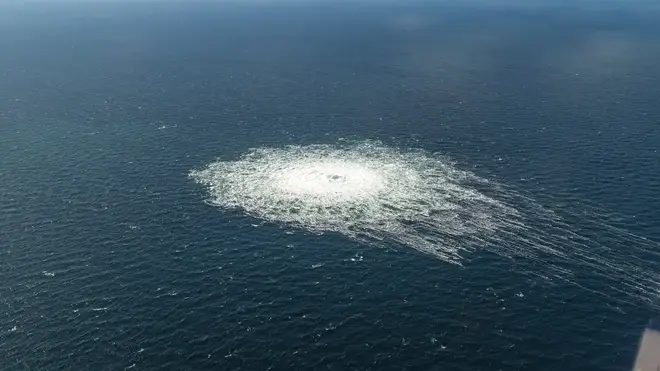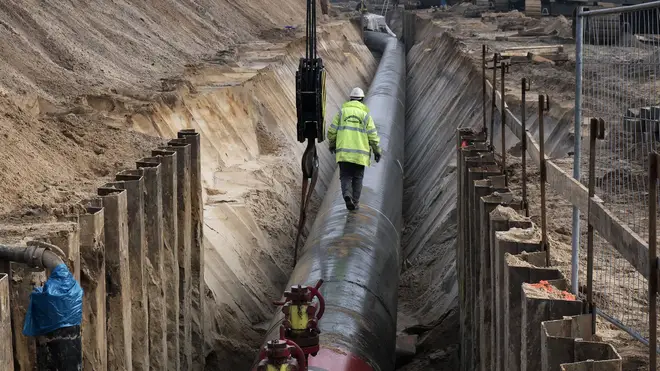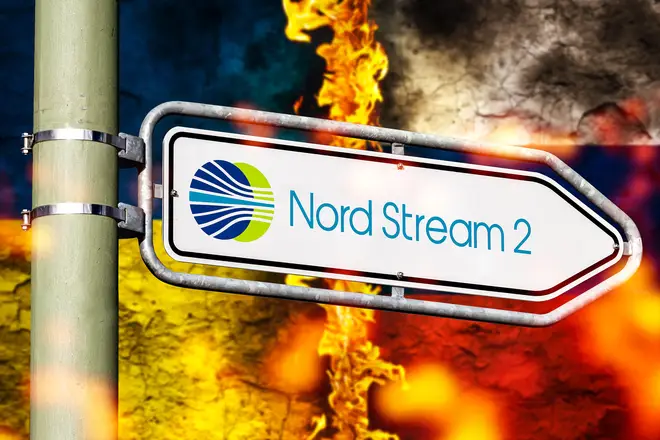
Vanessa Feltz 3pm - 6pm
27 September 2022, 15:12 | Updated: 27 September 2022, 19:30

Three mystery leaks are being investigated in the Nord Stream pipeline network, as the Ukraine accuses Russia of causing the damage in what they called a "terrorist attack".
Supplying Russian gas throughout Europe, Nord Stream 1 and 2 sit on the bottom of the Baltic Sea and have been key flashpoints in the ongoing energy war between Europe and Moscow that continue to cripple many Western economies.
The cause of the sudden and unexplained leaks is unclear, however seismologists reported multiple underwater blasts before the leaks emerged.
"There is no doubt that these were explosions," said Bjorn Lund of Sweden's National Seismology Centre.
Pointing the finger of blame firmly at Russia, Ukrainian presidential adviser Mykhaylo Podolyak described the explosions as "an act of aggression" aimed at causing pre-winter panic across the EU.
Meanwhile, the Russian government also responded to the mysterious attacks. The Kremlin spokesperson, Dmitry Peskov, said he was “extremely concerned” about the leaks, and sabotage could not be ruled out.

Read more: Arctic blast arrives as torrential rain and 50mph winds set to batter UK
Nord Stream AG, the operator, said the simultaneous damage to Nord Stream 1 and 2, all caused in a single day, is “unprecedented”.
The suggestion of sabotage has also been raised by a number of other European leaders, including Poland’s Prime Minister Mateusz Morawiecki.
Morawiecki said: "Today we faced an act of sabotage, we don't know all the details of what happened, but we see clearly that it's an act of sabotage, related to the next step of escalation of the situation in Ukraine.”
Denmark’s Prime Minister Metter Frederiksen added it was too early to come to conclusions.
However, she said: "We are talking about three leaks with some distance between them, and that's why it is hard to imagine that it is a coincidence."

The Nord Stream 1 pipeline consists of two parallel arms that have not transported gas since Russia closed it down for maintenance in August. The Kremlin blamed Western sanctions for causing technical difficulties and the temporary closure.
Western leaders said this was a excuse to stop supplying gas to Europe.
The Nord Stream 2 pipeline is yet to enter operation. Following the same 745 mile route between the Russian coast and north-east Germany, Germany scrapped its licence of Nord Stream 2 on the cusp of Russia’s invasion of Ukraine in February.
It came as the EU announced its determination to curb its reliance on Russian gas following the onset of war.
With neither pipelines in operation but still containing pressurised gas, the damage has caused a patch of sea disturbance measuring 1km (0.6 miles) in diameter but will not immediately affect the gas supply to Europe.

The Danish island of Bornholm in the Baltic Sea has since set up a five mile exclusion after the discovery of the leaks to protect shipping.
Nord Stream AG said they did not know when the gas network system would be operational again.
Poland, once Europe's primary energy supplier, has lead the effort in curbing the continent's reliance on Russian gas by opening a new pipeline of their own.
The Baltic Pipe is set to link Norwegian gas to Europe, providing countries to the south of Poland with access to the supply.
Energy prices across Europe have continued to soar since the war in Ukraine began, with decreased supplies threatening to push up costs even further.
It comes as the UK remains in the grip of a cost of living crisis, with many facing a winter without heating due to rising bills.